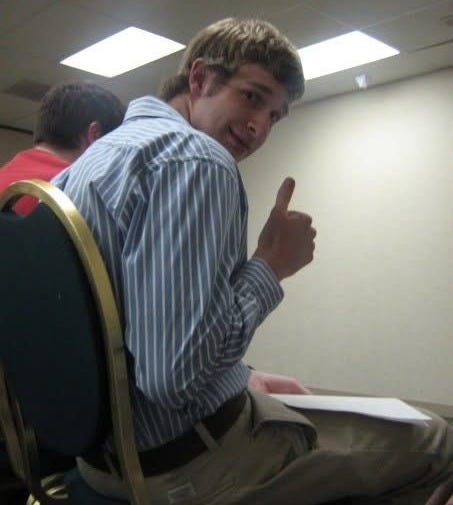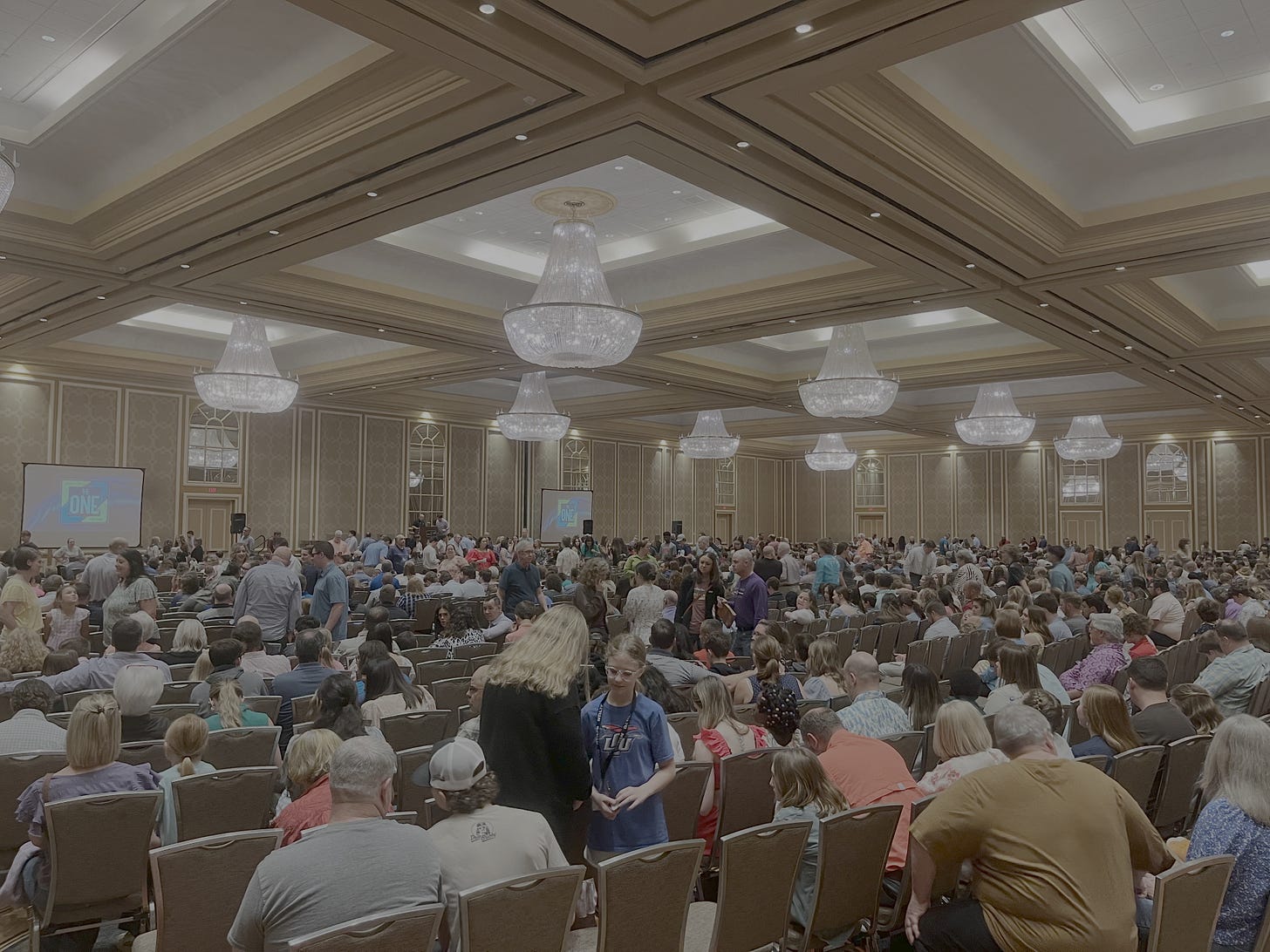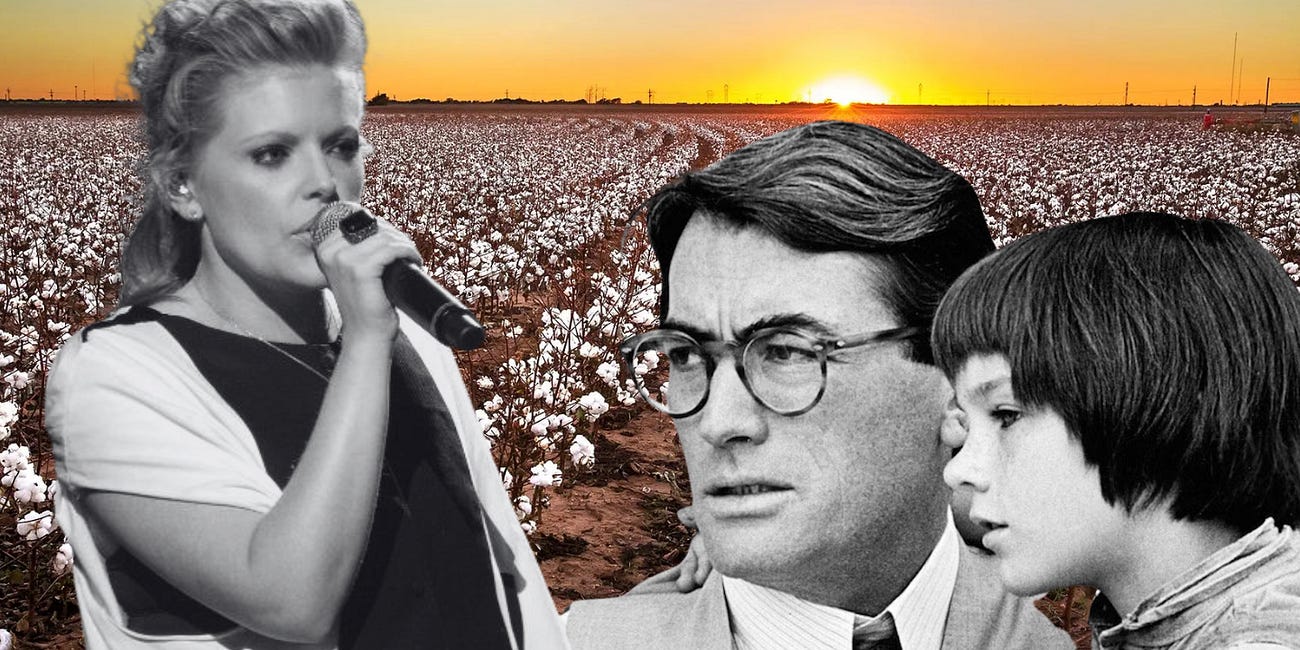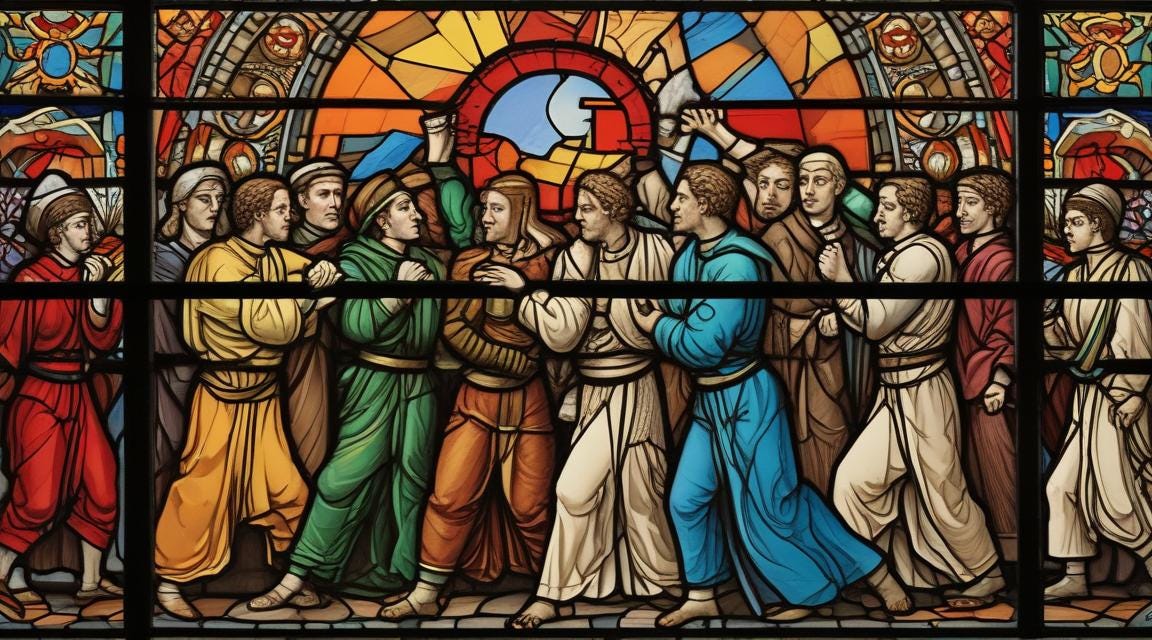I got another phone call from the fraternity president
This time it was very healing. Plus reflections on Easter, my alma mater and the Churches of Christ.

I was at lunch with family when a phone call came in, followed by a text message. It was “Brad,” the former fraternity president now pastor I had mentioned in my two-part series on pledging and depledging a Christian fraternity.
When we sing of Christian brotherhood, who gets to join the chorus?
[UPDATE: I got a phone call from the former president of the fraternity. He had been alerted to my posts that morning and called me after reading to apologize for what happened all those years ago. He was very humble and gracious and the apology meant a lot.]
What happens when you’re out of harmony with the chorus?
[UPDATE: I got a phone call from the former president of the fraternity. He had been alerted to my posts that morning and called me after reading to apologize for what happened all those years ago. He was very humble and gracious and the apology meant a lot.]
He wanted to call to express his sincere apologies.
This was the Saturday before Easter, one of the busiest times for most pastors, but he had read my posts earlier that day and felt compelled to call and apologize.
I called him back after lunch. He picked up on the second ring. He expressed his sincere regret over how he handled things all those years ago and for his role in the pledging process. He could not have been more gracious or humble. There was not even a hint of defensiveness.
But he didn’t stop there. He also said the pledging process was “wrong.” It was baptizing toxic behavior in the name of Christianity.
He had a gnawing sense that this process was deeply wrong even toward the end of his undergrad. Although he stayed at the same university, he distanced himself from the fraternity scene. He was a graduate assistant to a widely respected Bible professor, who was deeply opposed to fraternities and sororities, and that was also part of his journey toward seeing fraternities and the pledging process in a different light.1
I’m not sure which part of this conversation meant more to me—the sincere apology or the affirmation that the pledging process was harmful.
For years, I had been in this lonely category of depledgers. Those who had not experienced Bid Night and other parts of pledging didn’t truly know the full extent of what was happening. And those in a fraternity who did know were heavily invested (outwardly at least) in the idea that it was a positive, spiritually foundational experience.
For someone—the former fraternity president, no less—to say, “yes, this was wrong,” was revelatory. I also can’t put into words how healing that genuine apology was.
That was 13 Ryans ago
When thinking about regretful choices in our past, one of the most helpful concepts I’ve found comes from Rob Bell.
In a podcast episode, “That was 13 Robs ago,” Bell shares that it’s helpful to think of ourselves as versions. As we go through life, we change and grow. The person I was 5, 10, 15 years ago is not the person I am today.
My 20-year-old self was several Ryans ago. My guess is that if I ran into many of these guys today, the version they are now is different from the version they were when we were in our early 20s.
For example, one of the experiences I shared was a homophobic conversation with one of the members. It’s important to remember this was 2008. A popular show at the time, “Greek,” about Greek life at a fictional college, had a nearly identical storyline. I saw a fellow ACU grad got married recently to his now husband and this fraternity member, who I’m still friends with on Facebook, liked the wedding photo featuring a same-sex couple kissing.
In my post, I mentioned Brad and I ran into each other on campus years later and part of me wanted to ask if he regretted anything. I wish I had. Based on our conversation, it sounds like he was already a version or two removed from the person he was as fraternity president.
One thing I want to make clear is that the narrator of those two posts is 20-year-old Ryan. The version I am at 36 isn’t feeling all those strong emotions the same way. I’m not struggling with the same doubts. Yes, the experience left scars but they are not open wounds.
While my experience with pledging was negative, I am thankful for it. There are hard truths everyone has to learn, and college is probably the best time for it.
Throughout the process, we were told the purpose of pledging was “to know ourselves, know our brothers and know God.” But after I depledged I got to know myself, what I was about and what I wouldn’t stand for. I got to know my brothers and learned which ones cared about me as an individual and which ones saw me in terms of whether I was in or out of their fraternity. I also got to invest in deep friendships with other guys, many whom became lifelong friends.
But most importantly, I got to know God. I had all this free time after I depledged, and I filled that time with journaling and wrestling with who God was and what following Him looked like. The pledging/depledging experience forced me to grow in ways I may not have otherwise.
I know this as a 36-year-old. But I also knew that at 20.
What is pledging like now?
One of the questions I’m left with is, “What is pledging like now?” It’s been years since I’ve known anyone who pledged, but it does seem things have changed considerably. Just a few of the changes include:
Pledging takes place over two weeks, not six. This is a much more reasonable time requirement.
All pledges and current members are required to take an online course on preventing hazing. Under Texas law, failing to report hazing is a misdemeanor and punishable by a fine up to $1,000.
Bid Night is limited to 7 hours max. Had this been in place, we would’ve started around 4pm and ended at 11pm, not 4 in the morning.
Sponsors are required to be at every event. As I was writing this series, a question that frequently popped into my head was “where were the adults?” Events often took place at night in dark settings but I don’t remember faculty/staff sponsors at many pledging events.
Every fraternity/sorority is required to have a “risk management officer.” The designated officer will be “trained extensively in compliance, safety, hazing, and risk management.”
All activities must be no more than 20 minutes from campus. No more driving to fields in the middle of nowhere far from the eyes of the university president.
Areas must be well lit, and running water and closed-in restrooms must be readily available. Again, no more random fields.
All these changes seem like the right direction.
What does it mean to belong to a tribe?
The story of my pledging experience is specific to me. It took place at a specific university at a specific time. But it’s also a universal story. The intense desire to belong and determine insiders and outsiders is as old as humanity itself.
If there’s one common theme in many of my posts, it’s the dangers of tribalism and how people lose sight of things when they sort themselves into groups. And it’s especially dangerous when Christianity is used to condone that impulse, which resides in every human heart.
It’s in me.
A version of me several Ryans ago once worked for a political campaign. My role was to craft messaging that would scare and anger people into giving money to fuel this political operation. I significantly contributed to polarization during those 18 months, and perhaps my efforts at talking about tribalism are an attempt to atone for that.
As I write about polarization and tribalism, I have to be humble about how I’ve contributed to the problem. I think we all have to be.
Leadership Training for Christ
When I started the call with “Brad,” I asked if he had ever done Leadership Training for Christ (LTC). If you grew up in the Churches of Christ in Texas, there’s a 99% chance you participated in this annual tradition.
He had. He knew it well.
Every Easter weekend for decades, the youth from Churches of Christ all over Texas gather at a large hotel to practice song leading, act in skits, give speeches, compete in Bible quizzes, perform puppets, sing in choirs and a whole variety of activities often associated with being part of a church.
I loved LTC, even if I found the puppet practices monotonous. Traveling together with friends and family to Dallas, goofing off in the hotel, building camaraderie with the youth group. These are some core memories for me. I can tell they are for a lot of others, too. When I shared on social media that I was at LTC, multiple people who had grown up in Churches of Christ messaged me how fondly they remember that tradition.
The best traditions bring together vast groups of people to build them up and bind them with a shared purpose. At the conference, I saw young parents with babies, teenagers with grandparents and families from various walks of life. All investing in the next generation.
Having been an adult church volunteer for a few years now, I marvel at the number of hours the adults dedicate. I reflect back on my time growing up in church and realize all those Sunday school teachers, volunteers, puppet coaches, drama instructors were dedicating hours of their time out of their to desire to develop me and my peers.
The last time I attended LTC, I was a senior in high school. I had already been accepted to Abilene Christian University. It would only be 18 months before I would pledge a Christian fraternity. That’s how young we all were.
My parents and I were back at LTC this year to support my cousin. He’s a senior in high school. In the fall he’ll be attending Oklahoma Christian University, where another cousin and her husband attended. They still live in Edmond, Oklahoma.
After LTC, we visited another cousin and her husband. Both attended ACU around the same time I did. As I looked around, it was remarkable that six of the seven adults had attended a Church of Christ university. Of my 10 cousins and their spouses, eight of us attended a Church of Christ school.
The disillusionment I felt about ACU after I depledged was so painful because it wasn’t just my university, it was an extension of my entire faith community. It was like learning a dark secret about a family member.
That’s why the responses to my two posts have been so encouraging (all positive responses, so far). I was especially heartened by the many Church of Christ elders who reached out to say how wrong the pledging process was. It was as if my faith community all these years later was coming beside me.
I want to state clearly that I love ACU. And I love the Churches of Christ, even if I attend a different denomination now. At its worst, Churches of Christ can be insular, tribal. But at its best, it’s a tight-knit community constantly wrestling with how to love others well.
You can probably pick two random Church of Christ people and there will only be two degrees or less of separation between them. I once got a message from a former ACU professor trying to get a hold of an elderly man, Frank. A friend of Frank’s had just passed away and the family wanted to make sure Frank knew so he could attend the funeral. Frank was from Lubbock and even though “this is a long shot” my professor wondered if I knew him.
I did know Frank. He was a close family friend who went to the church I grew up in, which my family still attends. He was also my uncle’s dad (the father of my mom’s sister’s husband). I was able to connect my professor with my uncle and Frank was able to attend the funeral of his old friend.
I’ve felt so connected to the Churches of Christ and ACU lately, thanks to all the positive responses I’ve received from my two posts. I found myself calling the alumni office to be put back on the mailing and email list. I had taken myself off after several decisions I disagreed with, including “Holy Sexuality Week,” which I felt unfairly targeted LGBT people and was deeply hypocritical.
Divorce, double standards and debates on same-sex marriage
A version of this post is now featured on Baptist News Global.
I still believe ACU was deeply unfair in its decision to host “Holy Sexuality Week.” But there’s more than enough positive things to keep me connected to the community, including many people who also disagreed with the choices ACU was making.
Loving an idealized version of something isn’t really love. But to love something despite its flaws, despite the pain it sometimes causes, is how institutions, people and groups become stronger.
The last time I was in Abilene, I got lunch with one of my professors. We had kept in touch over the years, but he had reached out a few weeks after I published my post on “Divorce, Double Standards and Debates on Same-Sex Marriage,” which mentioned him by name. He had said he felt I was “writing and thinking about this in good faith,” and we had a good exchange that ended in plans to meet up the next time I came through town.
One of the main topics at lunch was our shared concerns over fraternities and sororities at ACU.
The next time I swing through Abilene, I also hope to meet up with my old podmate, “Griffin,” who moved back a few years ago. It’s been good to reconnect. He was the one who alerted the former fraternity president about my posts.
Easter Sunday
The final event of LTC is the church service on Easter Sunday. LTC has grown over the years to almost 3,000 attendees. I looked out at the audience and saw many familiar faces, family, friends, former youth ministers. Plenty of the friends I grew up with now had kids of their own in LTC.
But there were also complete strangers from churches large and small. All gathered together in one room.
One of the traditions of the Churches of Christ I love (and miss) is the a capella singing. Three thousand people singing together is a beautiful sound. There were many songs I haven’t sung in years, but remember from my childhood and young adult years. These are songs I still know by heart.
There is something about Easter, about Resurrection Sunday, knowing that Christians all over the world are gathering together. The traditions may differ, the songs may be sung in a different language, but the focus is the same: celebrating the resurrection of Jesus Christ.
I love being part of this chorus.
Thank you to everyone who read my posts about pledging/depledging. When I started on this journey, I had no idea so many people would read a two-part 11,000+ word series on a very personal experience. I’m so grateful for all the people who have been part of my life over the years.
Scout Finch can't go home again
I can only answer the question ‘What am I to do?’ if I can answer the prior question ‘Of what story do I find myself a part?’
Why good people are divided by politics and religion
When Jonathan Haidt published “The Righteous Mind” in 2012, it seemed America was uniquely divided politically. I remember watching a debate between Barack Obama and Mitt Romney and hearing one pundit say it was one of the most contentious presidential debates he had ever seen. Simpler…
I ran this language/description by the former fraternity president to ensure I was capturing his position accurately.











